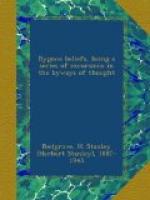[1] The Answer of BERNARDUS TREVISANUS, etc. Op. cit. p. 218.
[2] op. cit., p. 22.
[3] Ibid., p. 16.
[1b] EIRENAEUS PHILALETHES: The Metamorphosis of Metals. (See The Hermetic Museum, vol. ii. pp. 238-240.)
To say that “PHILALETHES’” seed resembles the modern electron is, perhaps, to draw a rather fanciful analogy, since the electron is a very precise idea, the result of the mathematical interpretation of the results of exact experimentation. But though it would be absurd to speak of this concept of the one seed of all metals as an anticipation of the electron, to apply the expression “metallic seed” to the electron, now that the concept of it has been reached, does not seem so absurd.
According to “PHILALETHES,” the extraction of the seed is a very difficult process, accomplishable, however, by the aid of mercury—the water homogeneous therewith. Mercury, again, is the form of the seed thereby obtained. He writes: “When the sperm hidden in the body of gold is brought out by means of our Art, it appears under the form of Mercury, whence it is exalted into the quintessence which is first white, and then, by means of continuous coction, becomes red.” And again: “There is a womb into which the gold (if placed therein) will, of its own accord, emit its seed, until it is debilitated and dies, and by its death is renewed into a most glorious King, who thenceforward receives power to deliver all his brethren from the fear of death."[1]
[1] EIRENAEUS PHILALETHES: The Metamorphosis of Metals. (See The Hermetic Museum, vol. ii. pp. 241 and 244.)
The fifteenth-century alchemist THOMAS NORTON was peculiar in his views, inasmuch as he denied that metals have seed. He writes: “Nature never multiplies anything, except in either one or the other of these two ways: either by decay, which we call putrefaction, or, in the case of animate creatures, by propagation. In the case of metals there can be no propagation, though our Stone exhibits something like it.... Nothing can be multiplied by inward action unless it belong to the vegetable kingdom, or the family of sensitive creatures. But the metals are elementary objects, and possess neither seed nor sensation."[1]
[1] THOMAS NORTON: The Ordinal of Alchemy. (See The Hermetic Museum, vol. ii. pp. 15 and 16.)
His theory of the origin of the metals is astral rather than phallic. “The only efficient cause of metals,” he says, “is the mineral virtue, which is not found in every kind of earth, but only in certain places and chosen mines, into which the celestial sphere pours its rays in a straight direction year by year, and according to the arrangement of the metallic substance in these places, this or that metal is gradually formed."[2]
[2] Ibid., pp. 15 and 16.




